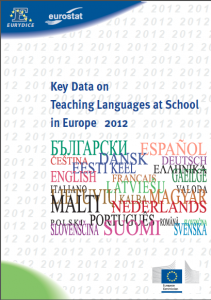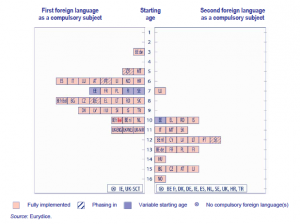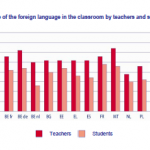 An interesting report on Teaching Languages in schools across Europe was published a few days ago.
An interesting report on Teaching Languages in schools across Europe was published a few days ago.
Key Data on Teaching Languages at School in Europe 2012 is a joint Eurydice/Eurostat publication, produced in close cooperation with the European Commission. The report is based on four main data sources: Eurydice, Eurostat, the European Survey on Language Competences (ESLC), and the OECD’s PISA 2009 international survey. Eurydice data covers 32 countries (27 Member States, Croatia, Iceland, Liechtenstein, Norway and Turkey) and takes the reference year 2010/11. [The report] contains 61 indicators and qualitative information describing the context and organisation of foreign language teaching, student participation levels as well as the initial and continuing education of foreign language teachers. In addition to giving a snapshot of the situation today, the report also presents several time series which are helpful in identifying trends in language teaching over recent years and past decades.
You can see the highlights of the report in the document below, or read the full version by clicking on the image on the left.
Some of the key points however are –
1. Students start learning foreign languages from an increasingly early age. It makes me really sad to see the UK block at 11 years old after all the hard work done to make it 7. And you can see that we’re far behind many other countries in Europe.
2. More students learn two foreign languages. Not in the UK though it seems.
3. English by far is the dominating foreign language in Europe.
4. Very few students learn languages other than English, French, Spanish, German or Russian.
5. Students’ perceptions of the usefulness of a language is a motivating factor for learning – and English is by far seen as the most useful. Perhaps this, and point 3, explain some of the UK’s language “apathy”? Trips are also pointed out as a motivating factor.

6. Teaching guidelines for foreign languages place equal emphasis on all communication skills – and yet both teachers and students make infrequent use of the target language in the classroom. Interestingly, the UK is not on the graphic for this section – I wonder why?
7. The Common European Reference Framework (CEFR) is becoming a main tool for defining student attainment levels. Also interesting to note that the UK is one of the few countries in Europe (along with Spain, Netherlands, French speaking Belgium and a few others) without an expected level of proficiency in a second language by school leaving age.
8. School reports difficulties filling vacancies for language teachers. I know a few great language teachers who would love a job!!
9. Few countries require teachers to spend an immersion period in the target language country. The UK does have recommendations about this, and also about the content of ITT. However, I think they could go further. You should have to visit regularly as well to keep ‘up to date’. Why not have funded sabbatical periods – even a week would be good – to revitalise your skills every two or three years? And I don’t mean a trip on which you’re supervising children, nor do I mean a week of sunbathing on the Italian riviera. Perhaps shadowing a colleague, or investigating something that interests you. And immersing yourself in a language and culture that you love.
I wonder if anyone who makes decisions about languages has read this report properly? Or have they just seen the ‘English is the most useful’ and thought ‘That’s Ok then’?












